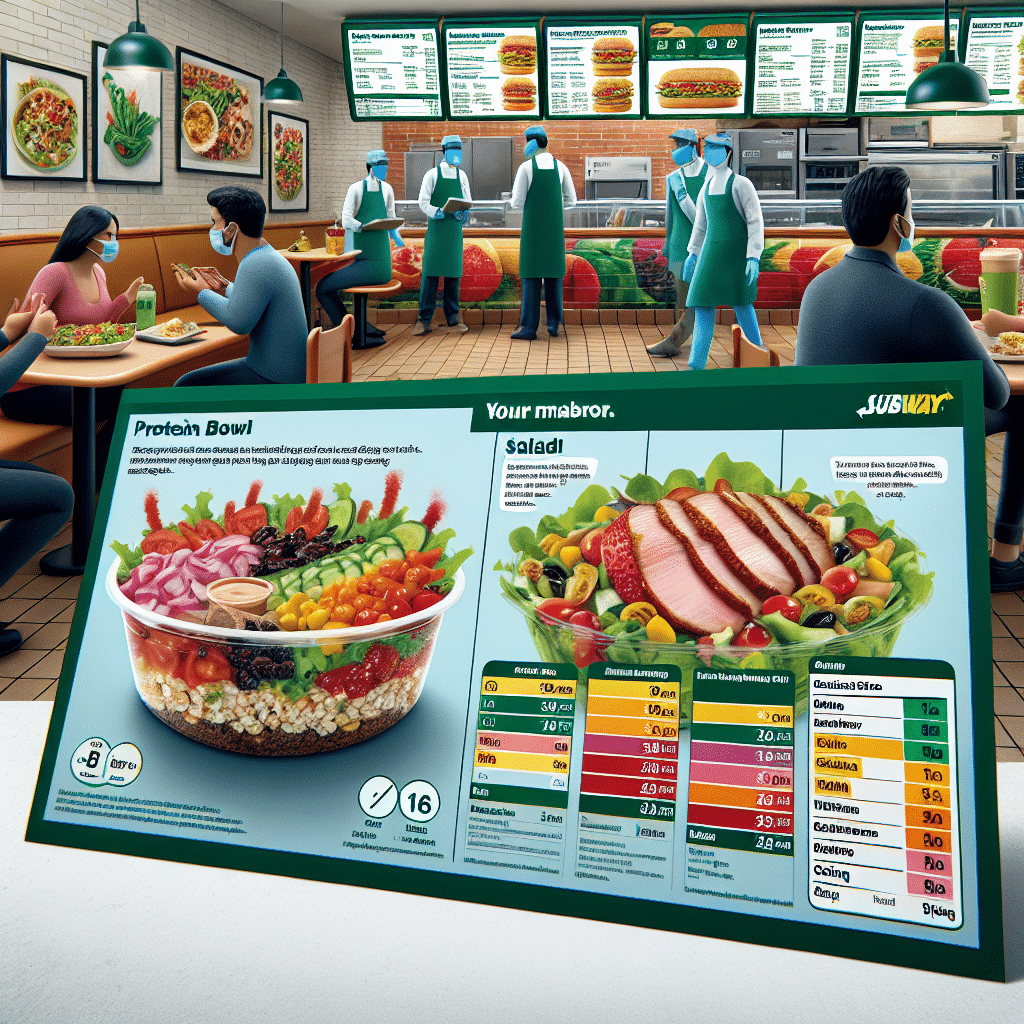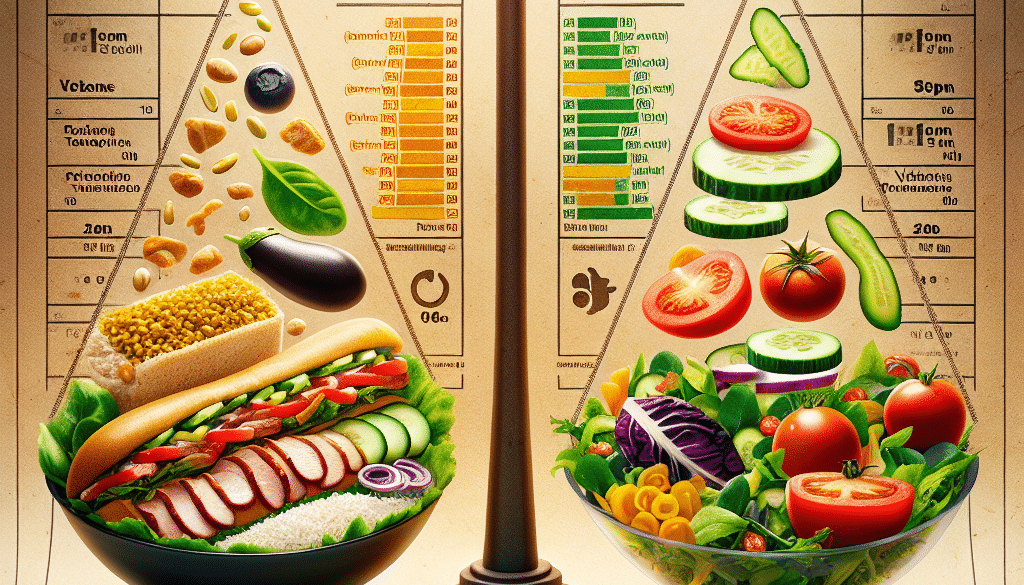Subway Protein Bowl vs Salad: Nutrition Face-Off
-
Table of Contents
- Subway Protein Bowl vs Salad: A Nutritional Showdown
- Understanding the Basics: What Are Subway Protein Bowls and Salads?
- Nutritional Content: Breaking Down the Macros
- Caloric Considerations: Which Is Lighter?
- Customization: Tailoring Your Meal to Your Diet
- Flavor and Satisfaction: Which Is More Fulfilling?
- Price Point: Comparing Costs
- Environmental Impact: A Consideration for the Eco-Conscious
- Conclusion: Weighing Your Options
- Enhance Your Diet with ETprotein’s Quality Products
Subway Protein Bowl vs Salad: A Nutritional Showdown

When it comes to fast food, Subway has carved out a niche for itself as a provider of healthier options compared to the typical burger and fries fare. With the introduction of their Protein Bowls and an array of salads, the chain has expanded its offerings to cater to health-conscious consumers and those following specific dietary plans. But when it comes down to choosing between a Subway Protein Bowl and a Salad, which one offers the better nutritional bang for your buck? Let’s dive into a detailed comparison to help you make an informed decision.
Understanding the Basics: What Are Subway Protein Bowls and Salads?
Before we compare the two, it’s essential to understand what each option entails. Subway’s Protein Bowls are essentially their famous sandwiches minus the bread, served in a bowl. They include the same fillings as the subs, such as a variety of meats, cheeses, vegetables, and sauces. On the other hand, Subway’s salads are a mix of fresh vegetables with the option to add in proteins, cheese, and dressings.
Nutritional Content: Breaking Down the Macros
When evaluating the nutritional content of Subway’s Protein Bowls versus their salads, it’s crucial to look at the macronutrients: carbohydrates, proteins, and fats. Here’s a breakdown of what you can typically expect from each option:
- Protein Bowls: These bowls are high in protein, as the name suggests, making them a favorite among those looking to increase their protein intake. The exact amount of protein will vary depending on the choice of meat or plant-based protein.
- Salads: Subway salads can also be high in protein if you choose to add meat or cheese. However, they are generally lower in calories and carbohydrates since they don’t include the same volume of protein-rich fillings as the bowls.
It’s also important to consider the types of carbohydrates present. Protein Bowls may contain more complex carbs due to the inclusion of more vegetables and beans, while salads are often lighter on carbs, especially if you opt for greens and non-starchy vegetables.
Caloric Considerations: Which Is Lighter?
For those counting calories, the difference between a Protein Bowl and a salad can be significant. Protein Bowls are typically more calorie-dense due to the larger portions of protein and additional toppings like cheese and sauces. Salads, especially when dressed lightly or with low-calorie options, can be much less calorific.
Customization: Tailoring Your Meal to Your Diet
One of the advantages of both Subway Protein Bowls and salads is the ability to customize your meal. Whether you’re following a low-carb, high-protein, keto, or vegetarian diet, you can tailor either option to fit your nutritional needs:
- Low-Carb: Opt for a salad with leafy greens, a generous serving of protein, and skip high-carb toppings like croutons or sweet dressings.
- High-Protein: Choose a Protein Bowl with double meat or add extra cheese and beans for an additional protein punch.
- Keto: Focus on high-fat, low-carb ingredients like avocado, cheese, and meats, while avoiding sugary dressings and toppings.
- Vegetarian: Both options can be made vegetarian by selecting from a variety of veggies and plant-based proteins, if available.
Flavor and Satisfaction: Which Is More Fulfilling?
While nutrition is important, so is enjoying your meal. Protein Bowls tend to be more satisfying due to their higher protein and fat content, which can help you feel full longer. Salads, while refreshing and light, may not always keep hunger at bay, especially if they’re lacking in protein or healthy fats.
Price Point: Comparing Costs
The cost of Subway’s Protein Bowls versus their salads can vary depending on location and the specific ingredients chosen. Generally, Protein Bowls may be slightly more expensive due to the larger quantity of protein. However, both options can be considered economical when compared to other dining out choices, especially when factoring in their nutritional value.
Environmental Impact: A Consideration for the Eco-Conscious
For those concerned about the environmental impact of their food choices, it’s worth noting that salads generally have a lower carbon footprint than meat-heavy Protein Bowls. Choosing plant-based proteins or opting for a veggie-filled salad can be a more sustainable choice.
Conclusion: Weighing Your Options
In the face-off between Subway’s Protein Bowls and salads, the best choice depends on your individual dietary goals and preferences. If you’re looking for a high-protein, satisfying meal that feels more like a traditional sub, a Protein Bowl might be the way to go. For a lighter, lower-calorie option that still offers plenty of customization, a salad could be your best bet. Ultimately, both provide nutritious alternatives to standard fast food options, making Subway a viable choice for health-conscious diners.
Enhance Your Diet with ETprotein’s Quality Products
If you’re looking to supplement your diet with high-quality protein, consider ETprotein’s range of plant-based protein products. Whether you’re adding a scoop to your post-workout shake or incorporating it into your homemade meals, ETprotein offers a variety of options to suit your nutritional needs.
About ETprotein:
ETprotein, a reputable plant protein vegan protein Chinese factory manufacturer and supplier, is renowned for producing, stocking, exporting, and delivering the highest quality organic bulk vegan protein and plant proteins. They include Organic rice protein, clear rice protein, pea protein, clear pea protein, watermelon seed protein, pumpkin seed protein, sunflower seed protein, mung bean protein, peanut protein etc. Their offerings, characterized by a neutral taste, non-GMO, allergen-free attributes, cater to a diverse range of industries. They serve nutraceutical, pharmaceutical, cosmeceutical, veterinary, as well as food and beverage finished product distributors, traders, and manufacturers across Europe, USA, Canada, Australia, Thailand, Japan, Korea, Brazil, and Chile, among others.
ETprotein specialization includes exporting and delivering tailor-made protein powder and finished nutritional supplements. Their extensive product range covers sectors like Food and Beverage, Sports Nutrition, Weight Management, Dietary Supplements, Health and Wellness Products, and Infant Formula, ensuring comprehensive solutions to meet all your protein needs.
As a trusted company by leading global food and beverage brands and Fortune 500 companies, ETprotein reinforces China’s reputation in the global arena. For more information or to sample their products, please contact them and email sales(at)ETprotein.com today.












